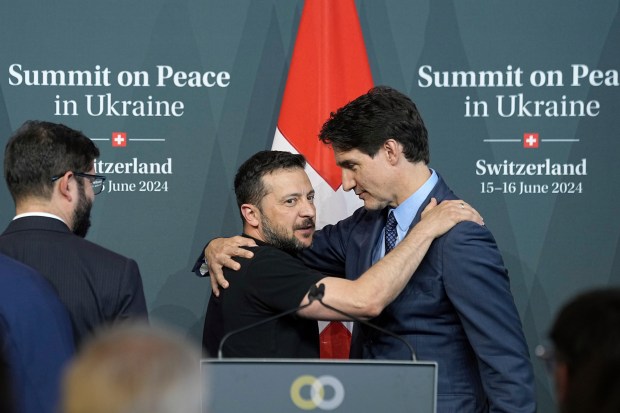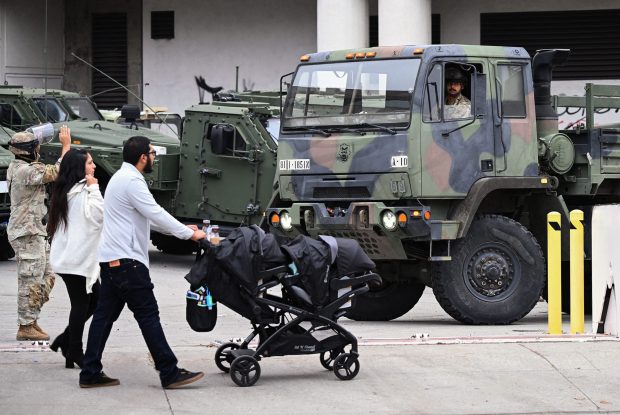Last weekend, the Bürgenstock Resort in the Swiss city of Obbürgen was a hive of diplomatic activity. The United States, Britain, France, Japan, Saudi Arabia, Kenya and dozens of other countries sent representatives to a conference that was designed to reinforce support for Ukraine as it resists Russian aggression and explore ideas that could bring the war to a close on Kyiv’s terms. Ukrainian President Volodymyr Zelenskyy spent months traveling the world to enlist as many participants as possible, going so far as to call out China in public for lobbying countries against participating.
For Ukraine’s purposes, the two-day conference was a hit. Delegation after delegation denounced Russian President Vladimir Putin for invading a sovereign neighbor. European Council President Charles Michel spoke some Ukrainian to show solidarity. United Kingdom Prime Minister Rishi Sunak blasted Russia for escalating nuclear rhetoric. And Vice President Kamala Harris emphasized that the best way to protect the rules-based international order was to defend Ukraine’s territorial integrity.
It all sounded pretty good from Zelenskyy’s perspective. But other than nice words and a relatively short joint communique that reiterated the importance of the United Nations Charter and outlined three uncontroversial items — nuclear installations in Ukraine should be secured, the Black and Azov seas should be open for trade, and prisoners of war should be exchanged and unlawfully deported Ukrainian children be returned to Ukraine — it’s hard to see what the conference achieved. In fact, we could question whether it was worth the effort at all.
The entire event was less about making peace and more about elevating Ukraine’s own position for what an eventual peace should look like. There are no doubt leaders in the West who believe this is a worthy cause in and of itself, if only to demonstrate to Putin that his strategy of continuing the war until the West gets tired is a lost cause. But practically speaking, getting on a soapbox and reiterating how terrible Russia is — even if it’s wholly justified — won’t do anything to actually stop the killing and resolve the war.
Bluntly put: “Peace summit” is a misnomer. This gathering wasn’t about peace at all. There were no negotiations going on between the two combatants; Russia wasn’t even invited to the conference (not that Russia would have joined). With the exception of Ukraine, no country in the room was actually fighting on the front lines. There was no attempt to do the difficult but necessary work of forging potential compromises. And compromises will need to be forged if the war in Ukraine is to end.
Instead, what we got was a talkathon filled with statements that might as well have been written by the same speechwriters. The event, in essence, was a way to make participants feel like they were doing something without actually doing anything. It scratched a morality itch.
Like all wars, facts on the ground and the strategic calculus of the combatants — not speechifying in faraway capitals — are the most vital elements at play. Historically, wars end in one of three ways: one side beats the other, the fighting freezes along a de facto front line (e.g., the Korean Peninsula) or the combatants come to the realization that more can be achieved at the negotiating table than the battlefield. With respect to Russia and Ukraine, we aren’t near that point yet.
As it stands, we could drive several trucks through the divide in Ukraine’s and Russia’s positions. The two remain motivated by an intense maximalism. A day before the summit in Switzerland kicked off, Putin proposed his own set of terms — if the Ukrainian army withdraws from the four Ukrainian territories Moscow annexed in 2022 and gives up on joining the NATO military alliance, then he will order his troops to cease warfare and order his diplomats to enter peace talks. The Ukrainian government rejected the proposal immediately, calling it an attempt by Putin to divert attention from the summit in the Swiss mountains.
Given that Russia doesn’t fully control any of the four territories Putin now claims are part of Russia, Kyiv was right to be dismissive of Putin’s ideas.
Ukraine, meanwhile, is just as absolutist as the Russians are. Zelenskyy talks a lot about a “just peace” for Ukraine, which sounds good in theory. In reality, though, Zelenskyy’s diplomatic strategy centers on a wish list, akin to what a 5-year-old child recites while waiting in line at the mall to see Santa Claus. Ukraine’s own terms include a total and complete Russian withdrawal from every square inch of Ukrainian territory, including Crimea, which Russia has occupied for a decade now; tens of billions of dollars in Russian compensation for war damage; and war crime prosecutions against Russian troops, officers and officials. Zelenskyy reaffirmed his position during the conference last weekend. Time and the Ukrainian army’s inability to retake territory over the last year and a half apparently haven’t had much impact on Zelenskyy’s thinking.
“Russia can start negotiations tomorrow if they pull out of our territories,” he told reporters during the conference.
Will Zelenskyy and Putin come around to ditching maximalism in favor of compromise? I don’t know. But what was clear from the outset was that the Swiss confab wasn’t going to move the needle either way.
Daniel DePetris is a fellow at Defense Priorities and a foreign affairs columnist for the Chicago Tribune.
Submit a letter, of no more than 400 words, to the editor here or email letters@chicagotribune.com.




